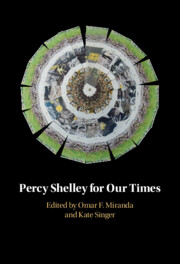Book contents
- Percy Shelley for Our Times
- Reviews
- Percy Shelley for Our Times
- Copyright page
- Contents
- Notes on Contributors
- Acknowledgments
- Abbreviations
- Introduction
- 1 Shelley, Treaty-Making, and Indigenous Poetry
- 2 Waiting for the Revolution
- 3 “A Chamæleonic Race”
- 4 Dream Defenders and the Inside Songs
- 5 Radical Suffering
- 6 Loathsome Sympathy
- 7 Hopeless Romanticism
- 8 Percy Shelley’s Sad Exile
- 9 Shelley in the Overgrowth
- 10 Creatrix Witches, Nonbinary Creatures, and Shelleyan Transmedia
- 11 Action at a Distance
- 12 Educating the Imagination/Defending Shelley Defending
- Further Reading
- Index
1 - Shelley, Treaty-Making, and Indigenous Poetry
Published online by Cambridge University Press: 07 March 2024
- Percy Shelley for Our Times
- Reviews
- Percy Shelley for Our Times
- Copyright page
- Contents
- Notes on Contributors
- Acknowledgments
- Abbreviations
- Introduction
- 1 Shelley, Treaty-Making, and Indigenous Poetry
- 2 Waiting for the Revolution
- 3 “A Chamæleonic Race”
- 4 Dream Defenders and the Inside Songs
- 5 Radical Suffering
- 6 Loathsome Sympathy
- 7 Hopeless Romanticism
- 8 Percy Shelley’s Sad Exile
- 9 Shelley in the Overgrowth
- 10 Creatrix Witches, Nonbinary Creatures, and Shelleyan Transmedia
- 11 Action at a Distance
- 12 Educating the Imagination/Defending Shelley Defending
- Further Reading
- Index
Summary
This chapter explores the way in which Shelley’s verse speaks to, and influences, two kinds of texts: the treaties between the various Indigenous peoples of North America and European or settler governments, and Indigenous-authored poetry that interacts with these treaties. The chapter will begin by conceptualizing 1819 (an iconic year in Shelley studies) as a “treaty year,” one in which Shelley’s “England in 1819” and The Mask of Anarchy, despite their apparent focus on domestic politics, can be read alongside major global diplomatic events that occurred in settler-Indigenous relationships in North America. The chapter then turns to late nineteenth- and early twentieth-century Native American poets who used Shelley’s political poetry as a source for considering treaties and the disastrous consequences of colonization, including the Cherokee authors John Rollin Ridge and Too-qua-stee, James Roane Gregory (Yuchi and Muscogee/Creek), and Arsenius Chaleco (Yuma). Their different allusions to and adoptions of Shelley’s 1819 poems in their poems demonstrate that both “England in 1819” and The Mask of Anarchy were interpreted by Indigenous poets as highly relevant to their contemporary concerns about broken treaties. Finally, the chapter considers the ways in which Shelley’s more meditative poems, including “To a Skylark” and “Mont Blanc,” might also be drawn into a wider conversation about colonization, treaty-making, and Indigenous peoples.
- Type
- Chapter
- Information
- Percy Shelley for Our Times , pp. 23 - 42Publisher: Cambridge University PressPrint publication year: 2024

